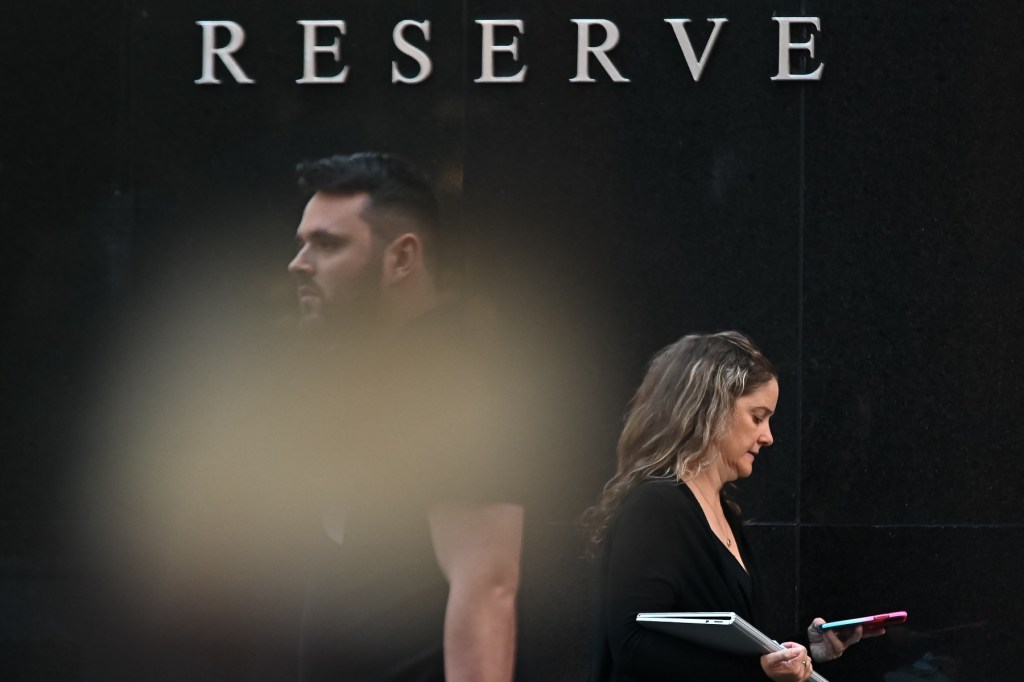Live: ASX to edge up at open, S&P 500 ends slightly higher but banks and energy weigh

- by Admin
- September 10, 2024
What’s causing the global oil price to fall?
Global oil price (Brent crude) is now below US$70 a barrel as US, China slowdown weighs.
Plus Apple’s double Irish tax deal unravels, Ireland ordered to recover 13 billion Euros (A$21 billion) in unpaid tax.
Here is an explainer from the ABC’s senior business correspondent Peter Ryan.
Why the sharemarket is near record levels despite ‘high risks’?
After hundreds of Australia’s biggest companies reported their half-year or full-year financial reports, analysts said many profits were not stellar.
Some companies reported better-than-expected profits, while many others recorded forecast downgrades.
More companies, including three of the big four banks, are due to hand down their financial year results in the months ahead.
Read more from Business Reporter David Chau and Lucia Stein.
Banks, energy stocks weigh on European bourses
European equity markets largely lost ground on Tuesday, weighed by bank and energy stocks as investors tread cautiously ahead of key US inflation data and an anticipated European Central Bank rate cut later in the week.
Shares of automaker BMW slumped 11%, notching their worst day in over four years after the company cut its 2024 profit margin outlook due to sluggish demand in its key Chinese market and problems related to a braking system supplied by Continental.
Continental shares dropped 10.5%.
“With China only getting tougher and BMW overexposed to China, and with H2 recovery expectations looking a bit optimistic, it remains tough to see the positive catalyst for BMW,” Citi analysts wrote in a note.
Bankstocks also fell sharply, tracking a sell-off in US lenders with analysts citing downbeat comments from Goldman Sachs CEO David Solomon.
Deustche Bank dropped 4.91%, and a European index tracking bank stocks lost 1.6%.
The oil and gas sector also fell 1.6% as Brent crude prices slipped below $US70 per barrel for the first time since December 2021.
The pan-European STOXX 600 index fell 0.5%, reversing gains from earlier in the day, with the automobile sector down 3.8% and German stocks falling nearly 1%.
Markets were uneasy ahead of Wednesday’s US inflation report, which could provide clarity on the size of the Federal Reserve’s rate cut when it meets next week.
The path for interest rates and economic growth in the world’s largest economy has largely set the tone for global markets over the past months.
In Europe, the ECB meets on Thursday and markets have fully priced in a 25 basis-point rate cut, though the policy path for the rest of this year remains more uncertain.
“The question for markets is what happens next,” analysts at ING said.
“(The ECB) downplaying the chance of an October cut and confining itself to quarterly steps on rates – at least for now – should act as a brake on the potential pace of easing.”
Will criticism of the RBA impact interest rate decisions?
The treasurer’s planned overhaul of the Reserve Bank board hangs in the balance after the opposition pulled its support for the legislation.
The impasse comes as the central bank and its monetary policy decisions face increasing scrutiny, with Jim Chalmers saying high interest rates have smashed the economy.
AMP deputy chief economist, Diana Mousina tells The Business Host Kirsten Aiken that the government is playing the blame game, and focusing attention on the RBA instead of examining the consequences of its own policy decisions.
Can a merger save Myer?
A major fashion retail consolidation is looming in Australia, as Myer considers buying Solomon Lew’s Premier Investment’s clothing business.
The merger involves brands Just Jeans, Jay Jays, Portmans, Jacqui E and Dotti. Retail analyst Geoff Dart says the deal makes sense for the 124-year-old department store chain, which has been struggling to appeal to younger shoppers and has “nothing to lose” from buying up the fast-fashion retailers.
Myer has previously tried to get in front of younger shoppers with its purchase of Sass & Bide, but recently revealed it would be closing 10 of the brand’s standalone stores.
The merger could see Solomon Lew return to the board of Myer. The retail tycoon was once the chairman until he was voted off by shareholders. His Premier Investment’s owns almost a third of Myer’s stock.
Watch this story from Business Reporter Emilia Terzon.
US bank, energy stocks fall on slowdown worries
Wall Street’s benchmark S&P 500 index closed up 0.5% on Tuesday but concerns about slowing economic growth stunted gains and the Dow dipped as bank stocks sank after warnings of current-quarter weakness while energy shares tumbled.
Energy was the biggest percentage decliner among the benchmark’s 11 industry indexes, losing 1.9%, as crude oil futures fell after OPEC+ cut its 2024 and 2025 demand forecast.
Bank stocks fell broadly after Goldman Sachs CEO David Solomon said late on Monday that trading revenue could fall 10% this quarter. On Tuesday, JPMorgan Chase tempered expectations about income from interest payments.
Also, the finance chief of smaller consumer lender Ally Financial said credit challenges have intensified this quarter, sending its shares down 17.6%.
The warnings from banks overshadowed an announcement by the Federal Reserve’s regulatory chief of a plan to significantly ease an earlier proposal to raise big banks’ capital.
“A lot of the action today is being driven by concern the banks are lowering expectations for earnings for the current quarter,” said Lindsey Bell, chief strategist at 248 Ventures in Charlotte, North Carolina. “The news from JPMorgan, Goldman Sachs and Ally stole the show because they’re saying that fundamentally their business is slowing down.”
Investors fretted over the economic implications of weaker energy demand on top of uncertainty about the Fed’s decision on interest rates next week and its comment on the economy. In addition, the US presidential election looms on November 5.
“We’re getting these signs that economic growth across the globe is slowing and it adds angst when we already have such uncertainty here with the election cycle,” Bell said, suggesting that September and October could be weak months for stocks.
Election uncertainty was in focus ahead of today’s televised debate between Democratic presidential candidate Kamala Harris and Republican candidate Donald Trump as the two meet for the first time.
ASX to open 0.1pc higher
Good morning and welcome to Wednesday’s markets live blog, where we’ll bring you the latest price action and news on the ASX and beyond.
A mixed session on Wall Street overnight sets the tone for local market action today.
The Dow Jones index dropped 0.2 per cent, the S&P 500 gained 0.4 per cent and the Nasdaq Composite finished 0.8 per cent higher.
ASX futures were up 8 points or 0.1 per cent to 8,008 at 7:30am AEST.
At the same time, the Australian dollar was flat at 66.53 US cents.
Brent crude oil was down 2.9 per cent, trading at $US69.74 a barrel.
Spot gold was up 0.4 per cent to $US2,516.11.
Iron ore lost 0.8 per cent to $US91.00 a tonne.
The Latest News
-
December 24, 2024North Lamar Australian Basketball
-
December 24, 2024We asked Golf Digest writers the story they were proudest of in 2024, and why – Australian Golf Digest
-
December 24, 2024Blueprint for success: how Australian architects made the world take notice in 2024
-
December 24, 2024‘Novak Djokovic will only care about the Australian Open and Wimbledon’
-
December 24, 2024PNG-Australia NRL Deal: K1.7 billion economic boost and 10,300 jobs expected





